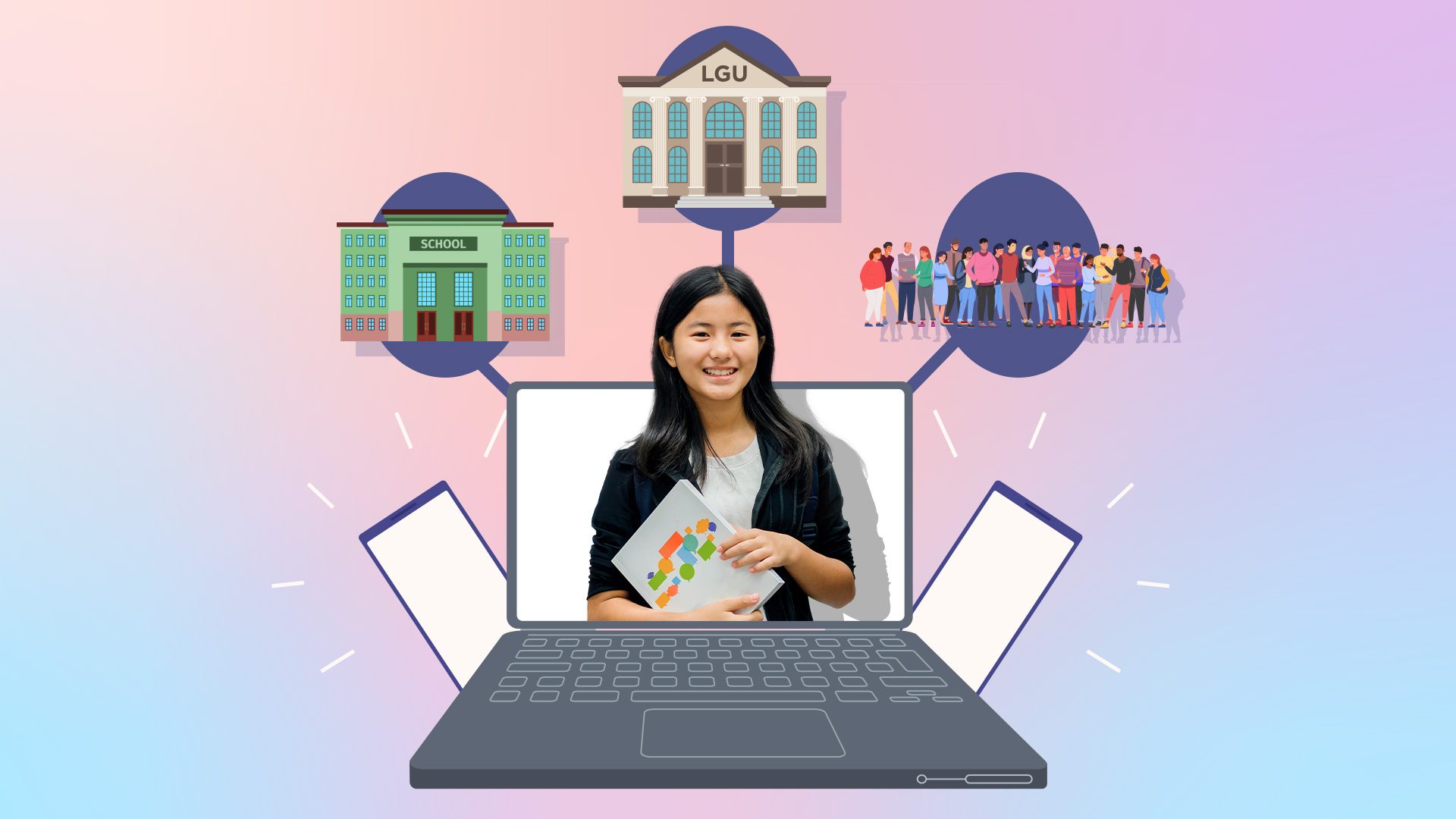SUMMARY
This is AI generated summarization, which may have errors. For context, always refer to the full article.

MANILA, Philippines – With the pervasiveness of online disinformation, it’s become even more important and crucial for people to be critical of the information they consume and post on social media.
However, not all people may be familiar with media and information literacy (MIL). In formal education, media and information literacy has so far been included in the senior high school curriculum. But as more and more people continue to spend time on social media, there is a need to boost MIL in the Philippines.
From January to February 2023, The #FactsFirstPH initiative, through Rappler’s civic engagement arm MovePH, led a five-week media and information literacy series that aimed to bring together teachers, students, and leaders in their respective sectors to learn and talk about how to be critical and discerning online.
The series tackled the digital media landscape and the importance of fact-checking, gave tips on practicing social media responsibility and digital hygiene, and shared how transparent and factual information can help in exacting accountability.
More than 2,700 participants nationwide joined the series. Participants suggested several ways to help boost media and information literacy in the Philippines, emphasizing how these could help improve government accountability and support a system of facts in the Philippines.
They also reiterated that the government and the private sector should be involved in the process of disseminating factual information down to the barangay level and holding disinformation peddlers accountable in local communities.
@ricca.22 #FactsFirstPH ♬ In The Forest (Acoustic Indie No Copyright) – Instrumental – Lesfm & Olexy
Why it’s important
Filipinos are social media savvy. We now rank fourth in terms of time spent on social media, according to Digital 2023, the annual report on worldwide social media and digital trends by Meltwater and We Are Social. Since anyone can be a publisher online, the internet can be utilized as an outlet of hate and anger, causing wide information disorder and loss of trust in news.
Given this, others pointed out that it’s now everybody’s responsibility to be careful with the information they post and share online.
My takeaway is that, our emotions are one of the main targets of social media because information disseminates rapidly when it involves strong emotion, click baits and tea🍵 for example. It targets people’s attention, and our vulnerable moments. @MovePH#FactsFirstPH pic.twitter.com/RlXyUjagFq
— jrald | ia (@jraldgrajo_) January 20, 2023
Some also shared that there’s a need to put in place policies and regulatory laws to curb false information on social media platforms and hold to account those sharing false information.
Our emotions play a big role in terms of our judgment toward the information we see online. Without the knowledge to verify these narratives, it creates the potential to manipulate and change public perception toward urgent issues. Several researches have unpacked the impact of disinformation on democracy.
platforms, hindi na natin malaman kung ito nga ba ay mapapagkatiwalaan o hindi. Dahil dito, nagiging prone tayo na maging biktima ng machineries of lies ng mga korap at sinungaling na mga lider. Isang dahilan kung bakit hindi natin masisisi ang karamihan sa mga —#FactsFirstPH
— kyle (@tteokbokkyle) January 20, 2023
As emotions play a role in what we post and consume online, the information we publish may now be subject to unwanted data collection, identity theft, cyberbullying, spam, and other online risks.
Accountability
Given the risks posed by disinformation peddlers, participants urged their communities to learn how to fact-check, protect their security, and utilize social media for social good by helping amplify movements advocating for truth.
araw-araw tayong makibaka upang labanan ang kasinungalingang ipinupukol sa atin. Bilang kasama sa bilang ng kabataan, dapat nating isulong ang laban kontra sa disinformation dahil tayo ang lubos na maaapektuhan nito sa hinaharap.#FactsFirstPH
— kyle (@tteokbokkyle) January 20, 2023
After all, “Social Media space is PUBLIC SPACE” (Ms. Gemma Mendoza, Rappler).
— Riyaaaa (@ardyeyoarel) February 10, 2023
Protektahan natin ang ating mga sarili sa digital space. Ugaliin natin ang pagsasagawa ng ‘digital hygiene’ upang magdagdag ng seguridad sa ating mga impormasyon. #FactsFirstPH@MovePH pic.twitter.com/YTPOzdVTWi
4. Stand up for yourself and others. If you feel unsafe online, you should feel comfortable to remove yourself from situation and report it to someone you trust. When you see cruel or dangerous activity online, offer support to those involved and report the incident.
— Trishan Diokno (@treesha_anne) February 4, 2023
+; no one we can share the burden with. Well, that is not true. With this vast number of people, although narrow, some are willing to stand by you — you just have to find the proper multitude. With them, your voice can be heard and be purveyed and echoed in every corner of the
— ✨ (@alfrancis_twt) February 18, 2023
“Our way of holding people accountable should come with a thought of redemption, not an ultimatum,” Krizia Sto. Domingo of Ateneo de Naga University emphasized.
Rappler CEO Maria Ressa pointed out during the series that it’s difficult to change what people think, but we can still try to correct false information and do so with empathy, respect, and kindness, especially when dealing with friends and family.
While social media users are expected to be digitally responsible citizens, the government must also ensure the safety of their citizens by securing their data rather than relying on them to handle the issue on their own.
Data privacy is still a joke in the Philippines. The government has to lead the way by making sure that all its agencies take care of our data. Even those that get reported in the news remain unresolved. We also need better media coverage of such stories. @MovePh #FactsFirstPh
— Raz de la Torre (@razdelatorre) February 10, 2023
Jamie Custodio from the University of the Philippines Diliman Extension Program in Pampanga expressed in her post that amid intimidation and repression, Filipinos must educate themselves about existing policies and mandates on accountability, especially those listed in the Constitution. Former chief justice Ma. Lourdes Sereno even emphasized that truth-telling is both a right and responsibility of every Filipino and telling the truth is high on the list of any government’s accountability.
Agencies like the Department of Education, Commission on Higher Education, National Historical Commission of the Philippines, and National Commission for Culture and the Arts have the duty to promote truth, as spelled out in the charter, said Sereno.
I realized that the problem of rampant misinformation and disinformation in the country currently lies within the system and the people taking advantage of this. That is why I believe that — pic.twitter.com/Z26sSDbO4t
— micaela (@MicaelaLimbo) January 29, 2023
Want to do your part in promoting media and information literacy and fighting against disinformation? Follow the #FactsFirstPH movement for updates or join the #FactsFirstPH video contest to help make facts go viral. – with reports from Joan Alindogan/Rappler.com
Joan Alindogan is a Rappler intern from TRACE College Inc. in Los Baños, Laguna. She is currently in her junior year taking up AB Communication Arts.
Add a comment
How does this make you feel?


![[OPINYON] Tungkol sa naging viral na social media conjecture](https://www.rappler.com/tachyon/2024/07/thought-leaders-conjecture-07262024.jpg?resize=257%2C257&crop_strategy=attention)

![[EDITORIAL] Apat na taon na lang Ginoong Marcos, ‘di na puwede ang papetiks-petiks](https://www.rappler.com/tachyon/2024/07/animated-bongbong-marcos-2024-sona-day-carousel.jpg?resize=257%2C257&crop=280px%2C0px%2C720px%2C720px)





![[OPINION] You don’t always need a journalism degree to be a journalist](https://www.rappler.com/tachyon/2024/06/jed-harme-fellowship-essay-june-19-2024.jpg?resize=257%2C257&crop=287px%2C0px%2C720px%2C720px)
![[DECODED] The Philippines and Brazil have a lot in common. Online toxicity is one.](https://www.rappler.com/tachyon/2024/07/misogyny-tech-carousel-revised-decoded-july-2024.jpg?resize=257%2C257&crop_strategy=attention)



There are no comments yet. Add your comment to start the conversation.